“Many a phrase has the English language -“:
VIRTUAL PROGRAM
Join us for a virtual professional development program for educators exploring Dickinson’s manuscripts. This participatory zoom workshop will provide context and exercises that illuminate Dickinson’s frequently cryptic poetry. Attendees will leave this 90-minute session with new teaching strategies.
Registration is required and is offered on a sliding scale from $5 – $20. Please select the ticket price that is right for you and consider supporting the Museum and the participation of other educators through your purchase. Tickets are non-refundable.
You may request a Professional Development certificate upon registration.
View the full educator workshop lineup.
For any questions, please e-mail edmprograms@emilydickinsonmuseum.org
REGISTER
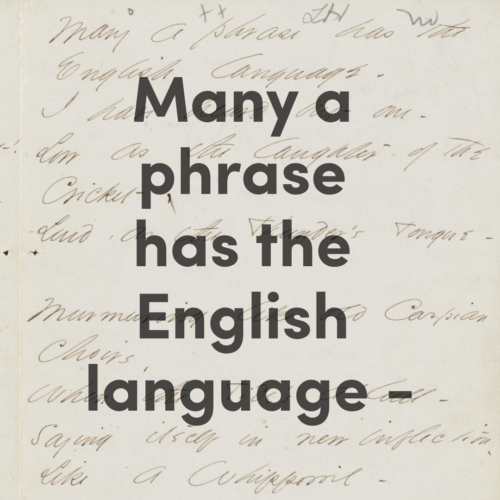
Because fewer than a dozen of Dickinson’s nearly 1800 poems were published during her lifetime, the poems we read and teach are rarely authorized or final texts. Dickinson’s original manuscripts sometimes exist in multiple versions; contain alternate words or phrases; are drafted on odd scraps of paper with striking shapes; and have line breaks different from the tidy quatrains with which they are usually printed. For example, in this poem that plays with the relation between the English language and the language of the natural world, Dickinson writes:
Breaking in bright Orthogra-
phy
creating an unconventional break in a line about breaking. This manuscript also includes alternate phrasings; she wonders whether the “push of Joy” in line 14 might instead be the “Pain of joy.” But Dickinson did not choose. There is no right answer to these manuscript questions. And that makes them a wonderful resource for teaching, for helping students get inside of Dickinson’s creative process, and for encouraging them to ask questions without fear of “getting it wrong.”
Join Karen Sánchez-Eppler for an interactive Zoom workshop discussing how to use Dickinson manuscripts in the classroom through the free Emily Dickinson Archive. The workshop will consider different approaches to the manuscripts, including poems that exist in variant versions, manuscript poems with alternate words, and those surprising, often visually stunning scraps an editor has dubbed her “radical scatters” and “gorgeous nothings.”
Many a phrase has the English language –
I have heard but one –
Low as the laughter of the Cricket,
Loud, as the Thunder’s Tongue
Murmuring, like old Caspian Choirs,
When the Tide’s a’lull –
Saying itself in new inflection –
Like a Whippowil –
Breaking in bright Orthography
On my simple sleep –
Thundering it’s Prospective –
Till I stir, and weep –
Not for the Sorrow, done me –
But the push of Joy –
Say it again, Saxon!
Hush — Only to me!
(Fr 333)
REGISTER
![]() Karen Sánchez-Eppler has been a professor of American Studies and English at Amherst College since 1988, specializing in 19th century literature and history, and so has long ties both to Dickinson and to Amherst. Her first book Touching Liberty: Abolition, Feminism and the Politics of the Body (1993) concludes with a chapter on Dickinson. She recently served as co-editor with Cristanne Miller of The Oxford Handbook of Emily Dickinson (2022) and is currently writing a brief critical biography, Emily Dickinson / Critical Lives, for Reaktion Books. Another of her book projects in process The Unpublished Republic: Manuscript Cultures of the Mid-Nineteenth Century US considers 19th century manuscript projects more broadly. Her book Dependent States: The Child’s Part in Nineteenth-Century American Culture (2005) considers writing by children, most of which also only exists in manuscript form. That project helped spur the creation of the Historic Children’s Voices database at the American Antiquarian Society facilitating a teacher’s institute on its use in 2024 that will run again in August 2026. Her scholarship has been supported by grants from the NEH, ACLS, the Newberry Library, the Winterthur Library, the Stanford Humanities Center, and the Fulbright Foundation. She spent the 2019-20 academic year as Distinguished Scholar in Residence at the American Antiquarian Society, is one of the founding co-editors of The Journal of the History of Childhood and Youth, past President of C19: The Society of Nineteenth-Century Americanists, President of the Porter- Phelps-Huntington Foundation Board of Directors, and a longtime member of the board of the Emily Dickinson International Society and of the Emily Dickinson Museum’s Board of Governors.
Karen Sánchez-Eppler has been a professor of American Studies and English at Amherst College since 1988, specializing in 19th century literature and history, and so has long ties both to Dickinson and to Amherst. Her first book Touching Liberty: Abolition, Feminism and the Politics of the Body (1993) concludes with a chapter on Dickinson. She recently served as co-editor with Cristanne Miller of The Oxford Handbook of Emily Dickinson (2022) and is currently writing a brief critical biography, Emily Dickinson / Critical Lives, for Reaktion Books. Another of her book projects in process The Unpublished Republic: Manuscript Cultures of the Mid-Nineteenth Century US considers 19th century manuscript projects more broadly. Her book Dependent States: The Child’s Part in Nineteenth-Century American Culture (2005) considers writing by children, most of which also only exists in manuscript form. That project helped spur the creation of the Historic Children’s Voices database at the American Antiquarian Society facilitating a teacher’s institute on its use in 2024 that will run again in August 2026. Her scholarship has been supported by grants from the NEH, ACLS, the Newberry Library, the Winterthur Library, the Stanford Humanities Center, and the Fulbright Foundation. She spent the 2019-20 academic year as Distinguished Scholar in Residence at the American Antiquarian Society, is one of the founding co-editors of The Journal of the History of Childhood and Youth, past President of C19: The Society of Nineteenth-Century Americanists, President of the Porter- Phelps-Huntington Foundation Board of Directors, and a longtime member of the board of the Emily Dickinson International Society and of the Emily Dickinson Museum’s Board of Governors.
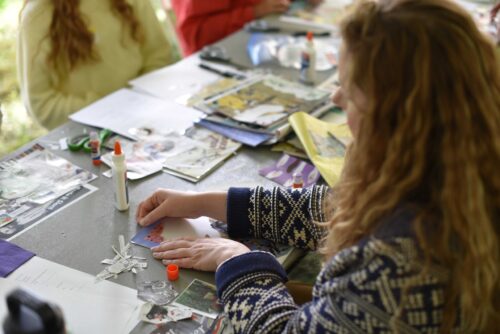 The Brain – is wider than the Sky –
The Brain – is wider than the Sky –
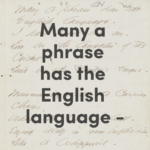

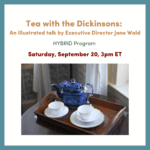
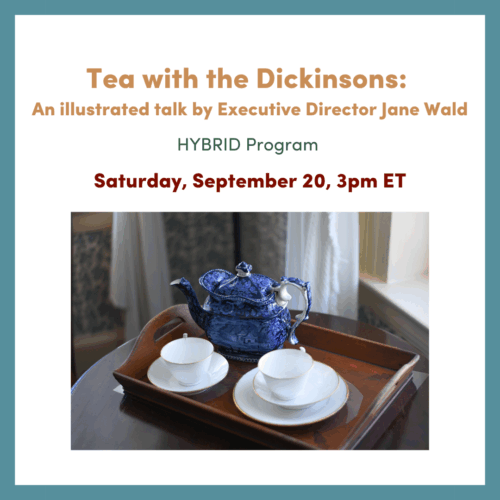 Introduced to the European market in the seventeenth-century, trade in tea – and subsequently in coffee and chocolate – became a means of establishing empires and generating the almost frantic consumerism of the eighteenth and nineteenth centuries in the West. Emily Dickinson and her family delighted in these exotic imported beverages and, like the rest of New England, acquired the requisite material goods to make and serve tea, coffee, and chocolate in their own family circle and for their guests. This talk will explore the meanings, settings, and equipment for “taking tea” in Emily Dickinson’s world, including original family objects now in the Museum’s collection.
Introduced to the European market in the seventeenth-century, trade in tea – and subsequently in coffee and chocolate – became a means of establishing empires and generating the almost frantic consumerism of the eighteenth and nineteenth centuries in the West. Emily Dickinson and her family delighted in these exotic imported beverages and, like the rest of New England, acquired the requisite material goods to make and serve tea, coffee, and chocolate in their own family circle and for their guests. This talk will explore the meanings, settings, and equipment for “taking tea” in Emily Dickinson’s world, including original family objects now in the Museum’s collection.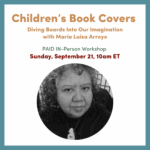
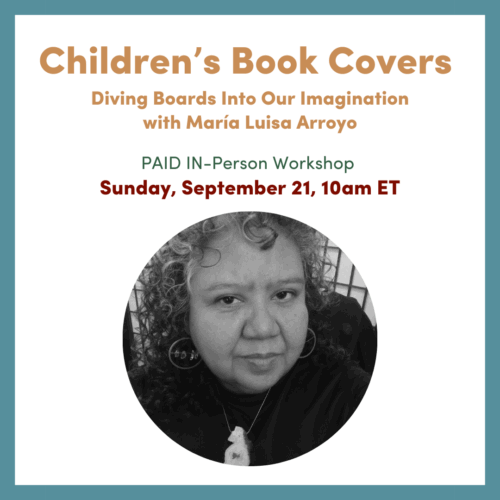 Beginner and experienced poets of all ages are invited to come and use children’s book covers as diving boards into memory and imagination. Children’s books will be on hand to browse, and participants will also be encouraged to search online for their own current or past favorite children’s books. Using one or more of the five senses (sight, sound, touch, smell & taste), participants will generate drafts of new poems as the vivid literary landscape of rhymes, illustration, and stories of childhood spark memories and new ideas.
Beginner and experienced poets of all ages are invited to come and use children’s book covers as diving boards into memory and imagination. Children’s books will be on hand to browse, and participants will also be encouraged to search online for their own current or past favorite children’s books. Using one or more of the five senses (sight, sound, touch, smell & taste), participants will generate drafts of new poems as the vivid literary landscape of rhymes, illustration, and stories of childhood spark memories and new ideas. 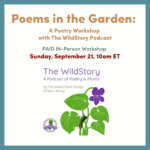
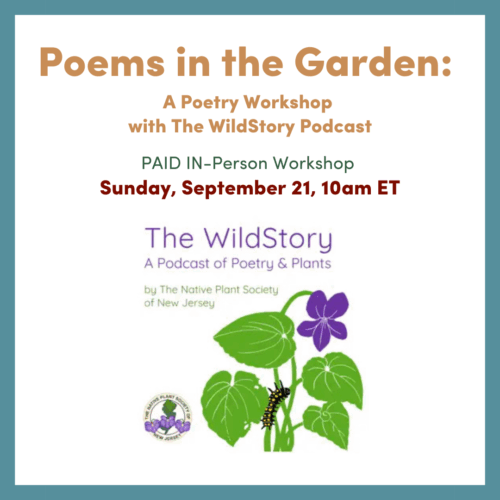 In a time of ecological crisis and increased disconnection from nature, poets create vital space to honor and reflect upon the natural world, with its joys and its losses. In this generative workshop led by The WildStory Podcast host Ann E. Wallace and featured guest Elizabeth Sylvia, poetry and nature enthusiasts of all ages and experience levels are invited to slow down and open their senses to the natural world—the memories it holds, the meanings it carries, and the feelings it inspires. Participants will engage in writing exercises, learn new strategies, and compose a poem draft during the session.
In a time of ecological crisis and increased disconnection from nature, poets create vital space to honor and reflect upon the natural world, with its joys and its losses. In this generative workshop led by The WildStory Podcast host Ann E. Wallace and featured guest Elizabeth Sylvia, poetry and nature enthusiasts of all ages and experience levels are invited to slow down and open their senses to the natural world—the memories it holds, the meanings it carries, and the feelings it inspires. Participants will engage in writing exercises, learn new strategies, and compose a poem draft during the session.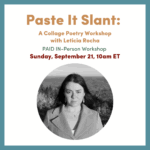
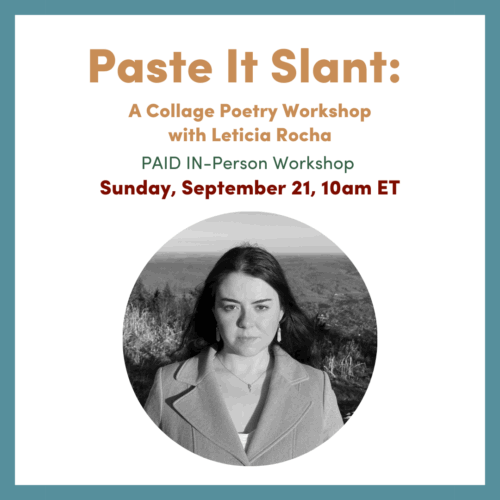 Join us for a generative workshop that pairs the visual art form of collage with poetry! Participants will be guided through a process of discovery with different collaging materials and text to create their own hand-crafted collage. You will walk away with seeds of poems, deeper knowledge and experience with a visual art form, and a found poetry technique to help you — in the immortal words of Emily Dickinson — “tell all the truth but tell it slant “! All levels of experience with poetry and visual art are welcome.
Join us for a generative workshop that pairs the visual art form of collage with poetry! Participants will be guided through a process of discovery with different collaging materials and text to create their own hand-crafted collage. You will walk away with seeds of poems, deeper knowledge and experience with a visual art form, and a found poetry technique to help you — in the immortal words of Emily Dickinson — “tell all the truth but tell it slant “! All levels of experience with poetry and visual art are welcome.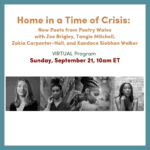
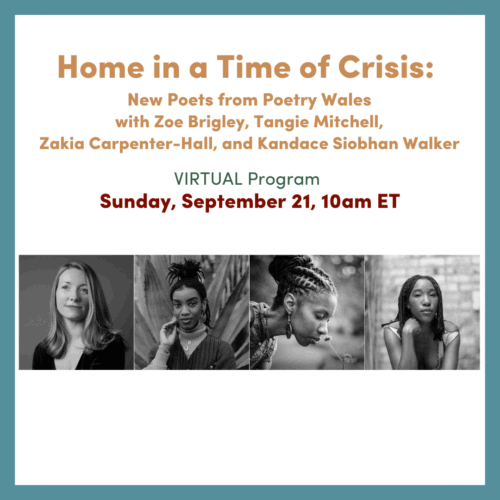 Where do we find home, belonging and comfort in a time of crisis? What might Emily Dickinson tell us about how to find comfort and strength when it sometimes feels like nothing we do can change things for the better? Head editor and chair Zoë Brigley presents three brilliant new editors from the magazine Poetry Wales: Kandace Siobhan Walker, Tangie Mitchell and Zakia Carpenter-Hall. These rising poetry stars will talk about where they find comfort, reading classic poems such as “Hope” is the thing with feathers’ alongside less well known Dickinson poems and their own work.
Where do we find home, belonging and comfort in a time of crisis? What might Emily Dickinson tell us about how to find comfort and strength when it sometimes feels like nothing we do can change things for the better? Head editor and chair Zoë Brigley presents three brilliant new editors from the magazine Poetry Wales: Kandace Siobhan Walker, Tangie Mitchell and Zakia Carpenter-Hall. These rising poetry stars will talk about where they find comfort, reading classic poems such as “Hope” is the thing with feathers’ alongside less well known Dickinson poems and their own work.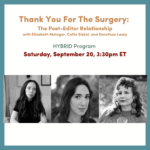
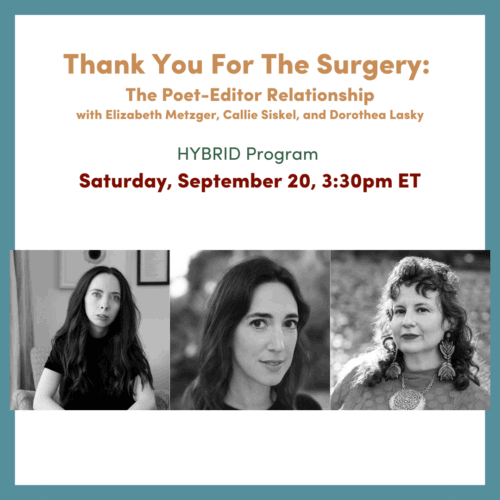 Callie Siskel and Elizabeth Metzger, poetry co-editors at the Los Angeles Review of Books, and poet Dorothea Lasky, will use the Higginson-Dickinson correspondence to consider the role of the poet as editor or editor as poet today and rethink our assumptions about the editor. Beyond the aim of publishing our work as poets, how might we see the conversation between poet and editor today as expanding possible pathways of creativity? We often think about the relationship between poet and reader, but the special role of the poet-editor offers an intermediary process that has the opportunity to transform, elevate, or pressurize our solitary artistic visions–sometimes by offering concrete feedback, sometimes by asking us to formulate our aesthetic vision or reconsider our projects and values, and other times simply by creating space in our society for a larger conversation around poetry, life, and listening. In a poetry world in which many editors are poets themselves, and a main avenue for becoming a poet is the workshop classroom, how might the editor-poet relationship create a correspondence that is at once formative, supportive, and expansive, and a relationship that is personally and professionally meaningful and ideally non-hierarchical?
Callie Siskel and Elizabeth Metzger, poetry co-editors at the Los Angeles Review of Books, and poet Dorothea Lasky, will use the Higginson-Dickinson correspondence to consider the role of the poet as editor or editor as poet today and rethink our assumptions about the editor. Beyond the aim of publishing our work as poets, how might we see the conversation between poet and editor today as expanding possible pathways of creativity? We often think about the relationship between poet and reader, but the special role of the poet-editor offers an intermediary process that has the opportunity to transform, elevate, or pressurize our solitary artistic visions–sometimes by offering concrete feedback, sometimes by asking us to formulate our aesthetic vision or reconsider our projects and values, and other times simply by creating space in our society for a larger conversation around poetry, life, and listening. In a poetry world in which many editors are poets themselves, and a main avenue for becoming a poet is the workshop classroom, how might the editor-poet relationship create a correspondence that is at once formative, supportive, and expansive, and a relationship that is personally and professionally meaningful and ideally non-hierarchical?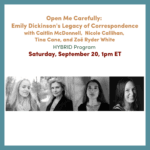
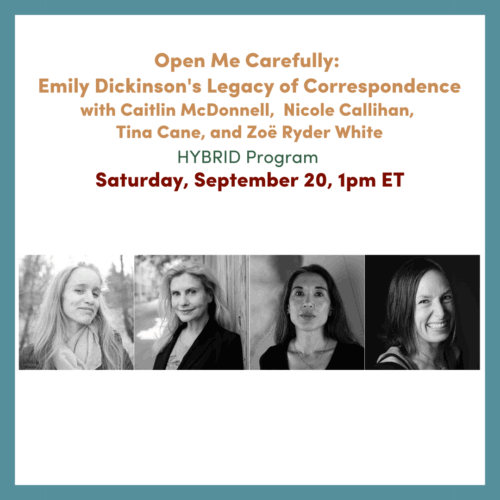 Emily Dickinson is known to have written more than a thousand intimate and poetic letters in her lifetime. What fueled these correspondences, and how did these correspondences fuel Dickinson’s creative mind? In this workshop, poets Nicole Callihan, Tina Cane, Caitlin Grace McDonnell, and Zoë Ryder White will discuss the necessity and ascendancy of correspondence in their own lives and work. Panelists will consider poetry’s deep intersection of private world and public sphere, and then ask participants to do the same as they pen their own letter-poems. This generative writing—if Nerve not be denied!—will be shared.
Emily Dickinson is known to have written more than a thousand intimate and poetic letters in her lifetime. What fueled these correspondences, and how did these correspondences fuel Dickinson’s creative mind? In this workshop, poets Nicole Callihan, Tina Cane, Caitlin Grace McDonnell, and Zoë Ryder White will discuss the necessity and ascendancy of correspondence in their own lives and work. Panelists will consider poetry’s deep intersection of private world and public sphere, and then ask participants to do the same as they pen their own letter-poems. This generative writing—if Nerve not be denied!—will be shared.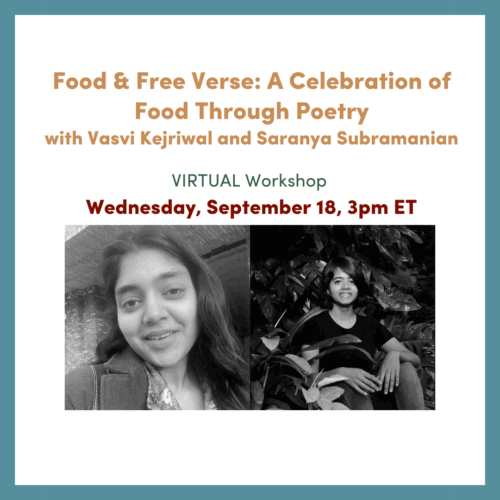 This is a unique poetry generative writing workshop for writers of all levels. We will meditate on different ways to perceive the way food nourishes the soul, just like a poem does: through memory and survival, through gratitude, through synesthesia, through love languages and through socio-economic commentary. Join us and leave with at least one solid poem draft!
This is a unique poetry generative writing workshop for writers of all levels. We will meditate on different ways to perceive the way food nourishes the soul, just like a poem does: through memory and survival, through gratitude, through synesthesia, through love languages and through socio-economic commentary. Join us and leave with at least one solid poem draft!